Like so many babies at the Maygoma Orphanage, Nariman Siddiq Ahmed Ali was brought here the day after he was born, sickly and barely alive, weighing less than 2kg.
Strangers found him in late February after he was dumped on a roadside in a far-flung suburb of this booming capital. Almost certainly he was the product of an illicit union, the writhing, irrefutable evidence of adultery or fornication in a county where that could mean a lifetime of shame or even death — for the mother and the child.
Just a few years ago, chances were Nariman would have perished at Maygoma Orphanage, as 80 percent of the children unlucky enough to end up there did, according to UNICEF. Orphans at Maygoma faced a Dickensian existence of want and neglect, many growing up nearly mute and badly stunted, cared for by workers who barely spoke to them and never held them, recoiling from them much like the society that viewed them as irredeemably corrupt by dint of their unfortunate birth. But in the last few years a radical shift led by an unusual coalition of government officials, Western aid organizations and religious leaders has taken place here. It has rescued many infants of Maygoma from a grim fate by transforming religious and legal attitudes toward illegitimate children in this deeply conservative society.
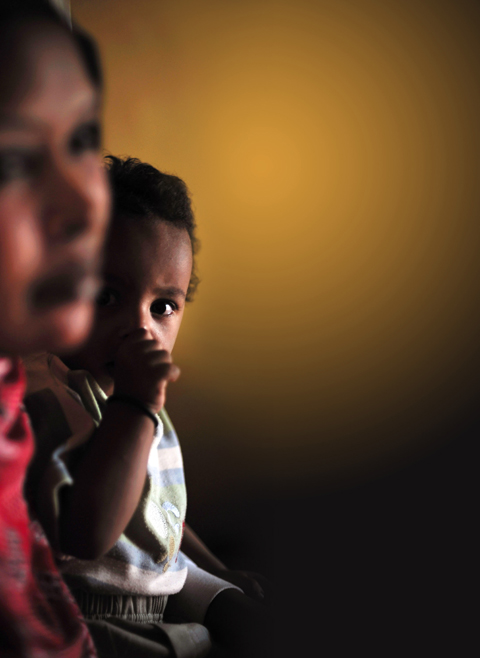
PHOTOS: NY TIMES NEWS SERVICE
Social customs here have traditionally passed the sins of the parent to the child, making adoption — already a complex issue in Islam, which emphasizes family ties of blood — largely out of the question. But under this new approach, Nariman, who last month lay burbling in a cot he shared with a pink teddy bear, gaining weight and being cooed over by nurses, waited not for death or a life of despair but for placement in a foster home and eventually a family to take him permanently.
“It is really a social revolution,” said Mona Abdullah El Faki, a government social worker who supervises foster care of children from Maygoma. “It was very difficult to persuade people that adoption is not forbidden in Islam. There are a lot of misconceptions.”
Few religions demand their adherents to contribute to charity as strongly as Islam, and caring for orphans brings special blessings. But Islamic law also forbids adoption in the Western sense, in which a child is absorbed into the adoptive family on equal footing with birth children. The blood relation between birth parent and child and all the rights and responsibilities it confers are sacrosanct and cannot be imitated, according to legal scholars here.
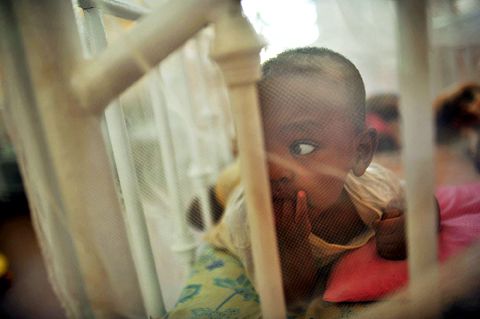
PHOTO: NY TIMES NEWS SERVICE
As a result, a child in Sudan raised by a family other than his birth family cannot be given that family’s name, nor can he inherit his father’s property as a birth child would, legal scholars and social workers here say. In addition, an adopted son, once he turned 18, would not be permitted see his mother or sisters uncovered, since they lack a blood relationship that would bar them from marrying, and an adopted girl would face similar problems of having to cover herself before male family members. Adoption by foreigners is forbidden here.
This thicket of legal issues has led some Muslims to conclude that the whole idea of taking a child permanently into one’s home is haram, or forbidden, under the laws of Islam. This is especially true in countries like Sudan, where Shariah, or Islamic legal code, is the law of the land.
To change those attitudes, the government, helped by UNICEF and some local aid organizations, consulted with hundreds of religious and social leaders, met with women’s groups, went to high schools and encouraged the news media to visit Maygoma and see the terrible conditions there.
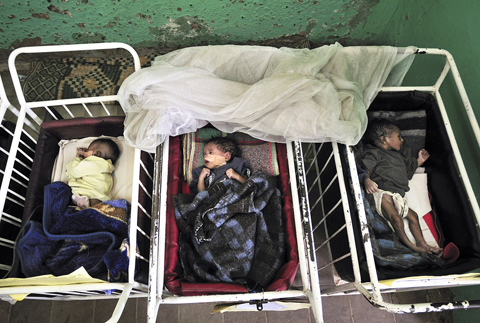
PHOTO: NY TIMES NEWS SERVICE
“It was no place to raise children,” said Osman Abu Fatima, a UNICEF program officer. “There were children who could not speak because no one talked to them. Some were malnourished. All were unloved. No one touched or held them. After my first visit I was traumatized by it for a long time.”
All that has changed. Admissions to the orphanage have held steady between roughly 500 and 700 a year, according to UNICEF statistics, but the orphanage has been renovated, and its nurseries are decked out with Snoopy clocks and Care Bears posters on walls painted bright yellow, pink and blue. Nurses are trained to hold and play with the children as they feed and care for them. Medical care has vastly improved. In 2001, 479 children died. In 2006, 186 did, according to UNICEF.
In 2004, the government passed a new law that said children should be raised in families, not institutions, as much as possible. But the most significant change came in 2006, when Sudan’s highest religious body, the Fatwa Council, issued a decree that changed the way orphans were viewed in Sudanese society.
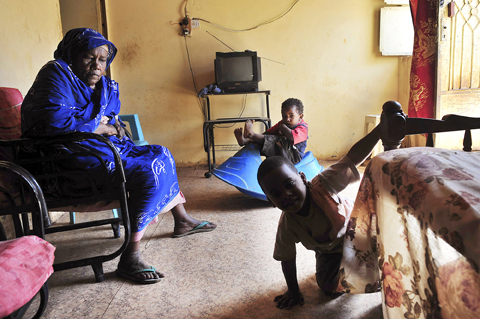
PHOTO: NY TIMES NEWS SERVICE
In the past, only children whose parents were known to have died were considered orphans in the Islamic sense, and only such children were entitled to the charity demanded of Muslims. But the fatwa ruled that abandoned children should be considered orphans too, which meant all of society had an Islamic duty to care for them.
The fatwa also declared that pregnancy in an of itself was not sufficient evidence to convict a woman of adultery, and that children born out of wedlock should not be made to suffer the consequences of their parents’ sins.
These changes have meant that women like Fatima Mohammad Abdel Rahman have welcomed children of unknown parentage into their homes in a way that would have been unthinkable just a few years ago. Rahman, 40, and her husband have been trying for years to conceive a child, and she had all but given up hope of ever having a family until she heard a radio program about foster care through Maygoma Orphanage.
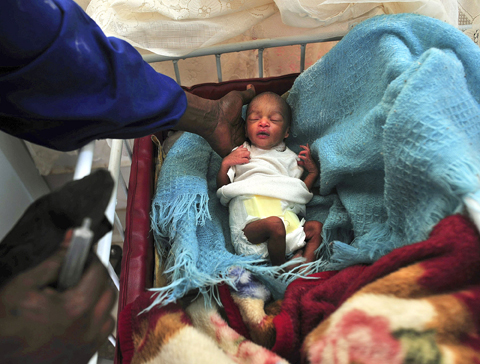
PHOTO: NY TIMES NEWS SERVICE
“Family is very important in our society,” she said. “A home with no children is a very bad place.”
When she and her husband brought a boy named Khalid home as an emergency placement, Rahman worried her husband would be uneasy.
“But he said, ‘it is very important for us to adopt this child,” Rahman said. “‘God loves all children.’”

PHOTO: NY TIMES NEWS SERVICE
Still, changing laws, both civil and religious, has been easier than changing attitudes. Many women, particularly those who have been unable to given birth, embrace foster parenting and adoption. But husbands often take more convincing.
Khanssa Sandal has been a foster mother to seven children, the latest being Muayid, who she took in when he was 2 months old. He is now more than a year old and ready to be adopted permanently. But Sandal’s husband, a trader who lives much of the year in Saudi Arabia, will not allow her to adopt Muayid.
“Each time it gets more painful to say goodbye,” she said, clinging to big-eyed Muayid, who hid in the folds of her shawl. She went over to a cabinet and pulled out a stack of photographs of all the children she has taken in. The fifth, a boy named Siddiq, was her favorite.
“I wanted to adopt him but my husband refused,” she said. “I cried for weeks. I still miss him.”
Officials in Sudan hope to persuade the families of children born out of wedlock to accept and raise them, but the crisis of abandonment continues virtually unabated. Now more than half are adopted by others, and a rising number have been reunited with their birth parents, something that is only possible when a family member leaves the infant at the orphanage rather than dumping it somewhere to be found.
“We need a fundamental social change,” said Hamad al Neer Haider, who works at the orphanage. “As a society we need to stop throwing away innocent babies.”

April 28 to May 4 During the Japanese colonial era, a city’s “first” high school typically served Japanese students, while Taiwanese attended the “second” high school. Only in Taichung was this reversed. That’s because when Taichung First High School opened its doors on May 1, 1915 to serve Taiwanese students who were previously barred from secondary education, it was the only high school in town. Former principal Hideo Azukisawa threatened to quit when the government in 1922 attempted to transfer the “first” designation to a new local high school for Japanese students, leading to this unusual situation. Prior to the Taichung First

The Ministry of Education last month proposed a nationwide ban on mobile devices in schools, aiming to curb concerns over student phone addiction. Under the revised regulation, which will take effect in August, teachers and schools will be required to collect mobile devices — including phones, laptops and wearables devices — for safekeeping during school hours, unless they are being used for educational purposes. For Chang Fong-ching (張鳳琴), the ban will have a positive impact. “It’s a good move,” says the professor in the department of

On April 17, Chinese Nationalist Party (KMT) Chairman Eric Chu (朱立倫) launched a bold campaign to revive and revitalize the KMT base by calling for an impromptu rally at the Taipei prosecutor’s offices to protest recent arrests of KMT recall campaigners over allegations of forgery and fraud involving signatures of dead voters. The protest had no time to apply for permits and was illegal, but that played into the sense of opposition grievance at alleged weaponization of the judiciary by the Democratic Progressive Party (DPP) to “annihilate” the opposition parties. Blamed for faltering recall campaigns and faced with a KMT chair

Article 2 of the Additional Articles of the Constitution of the Republic of China (中華民國憲法增修條文) stipulates that upon a vote of no confidence in the premier, the president can dissolve the legislature within 10 days. If the legislature is dissolved, a new legislative election must be held within 60 days, and the legislators’ terms will then be reckoned from that election. Two weeks ago Taipei Mayor Chiang Wan-an (蔣萬安) of the Chinese Nationalist Party (KMT) proposed that the legislature hold a vote of no confidence in the premier and dare the president to dissolve the legislature. The legislature is currently controlled